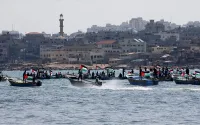Over 2000 Iraqis Killed in Fallujah
26 November 2004juancole.comCBS has elicited from the Pentagon the real figure of US casualties in Iraq, which is more like 25,000. That number includes the 1230 or so killed and the 9300 classified as "wounded in battle," but also 17,000 classified as non-combat sick or injured, of whom 80 percent do not return to their units in Iraq. Although some of the 17,000 are victims of disease, some unspecified number have actually been injured as a result of being in a theater of war. If you have an "accident" while guns and bombs are going off all around you, is it really an "accident"?The Editor and Publisher piece blames the "US press" for under-reporting these figures. But obviously it is the Department of Defense that constructed the categories that allowed some war heroes to be shunted off as victims of "accidents." So it isn't the press's fault. It is Donald Rumsfeld's fault (and, sure, Karl Rove and George W. Bush, the Teflon Twins).The Iraqi Defense Ministry has admitted that 2085 Iraqis were killed in the course of the US assault on Fallujah. The same ministry, along with US military spokesmen, keep denying that any civilians were killed. Personally, I would take all these statistics with a big grain of salt. The US has bombed so many buildings in Fallujah in recent weeks that there must be bodies still in the rubble. Will the rubble be combed for dead bodies? And, even if, as some US military personnel have suggested, 95% of civilians had fled, that would be on the order of 15,000 persons. How likely is it that a massive military assault on residential neighborhoods killed none of them? Some un-embedded wire service reports suggest a different picture, saying that Fallujah survivors :
"charged, in interviews, that as well as deaths from bombs and artillery shells, a large number of people, including children, were killed by American snipers. Some of the killings took place in the build-up to the assault on the rebel stronghold, and at least in one case, that of the death of a family of seven, including a 3-month-old baby, American authorities have admitted responsibility and offered compensation. Men of military age were particularly vulnerable. But there are also accounts of young children, women and old men being killed.Mere common sense, it seems to me, makes these reports more credible than blithe claims of no "collateral damage" at all. On the other hand, Iraqi guerrillas are perfectly capable of manufacturing US war crimes where none existed, as part of their own propaganda war. That there were almost certainly civilian casualties does not in and of itself tell us whether the military assault was necessary, or whether it was conducted as it should have been.The fog of information war thrown up by the Allawi government, the US military, and the guerrilla sympathizers, however, does make the episode difficult to judge morally and ethically. In a democracy, such judgments are necessary, so that there is something radically wrong with the system, when we ordinary Americans don't have a realistic idea of how many US troops have been harmed in the prosecution of this war, and likewise have no clear idea of the human cost of an operation like Fallujah II.The irony of the twenty-first century Information Age is that the American public is uninformed as never before about the most crucial information in our lives. The new Age of Ignorance amidst information riches is made possible precisely because modern means of communication lend themselves to manipulation by wealthy, powerful forces that understand how to make an emotional impact that will obscure the real issues. This observation is as true of the Baath Party as it is of the Republican Party, as true of al-Jazeerah as it is of Fox Cable News. The difficulties of political interpretation are, it seems to me, underscored by the interview that Majid Musa, deputy speaker of the Iraqi National Council and leader of the Iraqi Communist Party, gave to Egyptian Radio (BBC World Monitoring, Nov. 23).
The Egyptian interview asked what the participants at the Sharm El Sheikh conference could be expected to agree on."Majid: I believe that there is a common ground and that a consensus is possible. The continuation of the unstable conditions, the deteriorating security situation in Iraq and the activities of terrorists and saboteurs will not be restricted within Iraqi borders. The impact of those crimes and this terrorism will spread throughout the region, unless we take timely measures and cooperate to ward off such dangers." He added that the issue of the exact shape of Iraqi federalism was an internal affair.The Cairo interviewer asked him about a deadline for withdrawal of US troops. (France had pressed for a deadline of Dec. 31, 2005, for this withdrawal, but the other Sharm El Sheikh participants, including Egypt, rejected it)."Majid: As for the other issue, which is the withdrawal of foreign forces, it is an objective that all Iraqis without exception seek to achieve. Nobody could claim that they are keener than the Iraqi people to see a quick end to the presence of foreign troops. However, the problem is deciding when those troops could depart. We have not yet built sufficient military, police or security forces to protect the security of Iraq."It appears to me that the stance of the Iraqi Communist Party, at least for now, is not so far from that of the US government-- curb terrorists and saboteurs, decide on federalism in the Iraqi parliament, and be patient about foreign troops until an Iraqi military can be trained. That is, the ICP seems somewhat to the right of the Gaullists here!What seems indisputable to me is that Spencer Ackerman at Iraq'd is correct to be skeptical of the Bush administration arguments, reported by David Ignatius of the Washington Post, that the Sunni Arabs can be so beaten down and terrified that they will fall in line behind Iyad Allawi! See the comments, above, of Mark Levine.Rather, the political wages of Fallujah are ethnic division, anger and sullenness that could cripple Iraq well into the future.If this observation is true, then the current operation in Babil province, which continued on Thursday, is also unlikely to yield the political fruits sought. In addition, AFP writes, "On the ground, four people were killed and 16 wounded in two bomb attacks in Samarra, one of them a suicide attack, and another south of the main northern oil capital of Kirkuk."Radio Sawa Iraq is reporting, via Reuters, a huge explosion at the Green Zone (government offices and US embassy) in Baghdad, resulting in a big column of smoke. How you have elections when the most politically important parts of the capital are in this condition, I have no idea.According to AFP, the story being trumpeted all day on Fox Cable News about the discovery of chemical and anthrax weapons labs in Fallujah by Iraqi troops is questionable to say the least. The US military denies it and Hans Blix is skeptical. I smell the troika of Iyad Allawi, Naqib al-Falah, and Hazem Shaalan behind this announcement, which will be remembered even if it is discredited.






